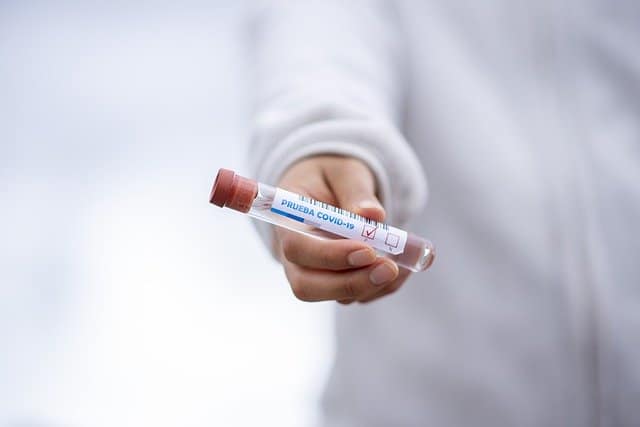The Lancet magazine has published two articles with the results of two candidates for COVID-19 vaccines, one British and the other Chinese. Both, still in the clinical trial phase, have been shown to be safe and to induce an immune response.
1,077 volunteers from 18 to 55 years of age participated in the University of Oxford and phase 1/2 tests show that it is safe, that it causes few side effects and induces a “strong” immune response, causing a T cell response and of antibodies until day 56 of the tests.
These findings are considered “very promising,” although larger-scale trials are still needed to determine whether the antibodies are sufficient to offer long-term protection against the disease.
Chimpanzee common cold
The British vaccine called ChAdOx1 nCoV-19, which is being developed at an unprecedented rate, is made from a genetically modified virus that causes the common cold in chimpanzees.
Professor Andrew Pollard of the University of Oxford (UK) explains that the new vaccine uses a common cold virus (adenovirus) that infects chimpanzees, which has been weakened so that it cannot cause any disease in humans. , and is genetically engineered to encode the Spike protein from SARS-CoV-2 (the one it uses to enter human cells).
This means that when the adenovirus enters the cells of the vaccinated people it also gives the genetic code for that protein. This causes these people’s cells to produce Spike and “helps teach the immune system to recognize the SARS-CoV-2 virus.”
Vaccines that are considered effective induce both antibodies and T-cell responses, a type of white blood cell that help coordinate the immune system and can detect and destroy which cells have been infected.
Train the immune system
The study showed that 90% of people developed neutralizing antibodies after being injected with one dose and only ten people were given two doses, of whom all produced more of these antibodies. The vaccine is safe and “trains” the immune system, according to those responsible.
Despite the relevance of these early discoveries, experts have warned that the study has not been operational long enough to understand whether it offers long-term immunity.
As for the side effects, the scientists determined that they exist although they are not considered dangerous.
In their trials, they found that 70% of people who participated in the study developed fever or headache, although these symptoms could be treated with paracetamol.
“There is still a lot of work to be done before we can confirm whether our vaccine will help control the COVID-19 pandemic, but these preliminary results are promising,” said Sarah Gilbert of the University of Oxford.
Phase two of the Chinese vaccine
In China, the results of the second phase of clinical trials of a vaccine candidate demonstrate that it is safe and induces an immune response against the coronavirus.
The tests were carried out on more than 500 people and are a continuation of the first ones that were published last May, also with positive results; More human trials, this time in phase 3, will be needed to confirm whether this candidate vaccine effectively protects against SARS-CoV-2 coronavirus infection.
The randomized trial now tried to assess the immune response and safety of the vaccine, and the results provide data from a larger group of participants than Phase 1, including a small subgroup of people over 55 years of age.
The authors emphasize, however, that no participant was exposed to the virus after vaccination, so it is not yet possible to determine whether the vaccine candidate effectively protects against SARS-CoV-2 infection.
“This trial adds further evidence on safety and immunogenicity in a larger population, which is an important step in evaluating this experimental vaccine,” says Feng-Cai Zhu of the Jiangsu Provincial Center for Control and Prevention of Diseases, who adds that phase 3 is underway.
508 participants
Overall, testing of this vaccine, which uses a weakened common cold virus – adenovirus type 5, Ad5-nCoV – to supply genetic material, was done with 508 participants.
Of these, 253 received a high dose of the vaccine, 129 a low dose and 126 a placebo; Approximately two thirds (309; 61%) were between 18 and 44 years old, a quarter (134; 26%) were between 45 and 54 years old, and 13% (65) were 55 years old or older.
The trial found that 95% of participants in the high-dose group and 91% of recipients in the low-dose group showed immune responses of T cells (a type of white blood cell that plays a key role in the immune response. ) or antibodies against the virus 28 days after vaccination.
The vaccine induced a neutralizing antibody response in 59% and 47% of participants and a binding antibody response – may bind to but not necessarily attack the coronavirus – in 96% and 97%, in the dose groups highs and lows, respectively.
Most adverse reactions were mild or moderate, and 9% of participants in the high-dose group had serious adverse reactions; the most common serious was fever.
Compared to the younger population, the older ones generally had significantly lower immune responses.
The authors recall that this clinical trial was conducted in Wuhan, China, and other countries may have different immunity rates that should be considered.
Furthermore, the trial only followed up for 28 days, so this study does not have data on the duration of induced immunity. The authors also indicate that some people may already have pre-existing antibodies against the common cold virus, which could be a disadvantage.
